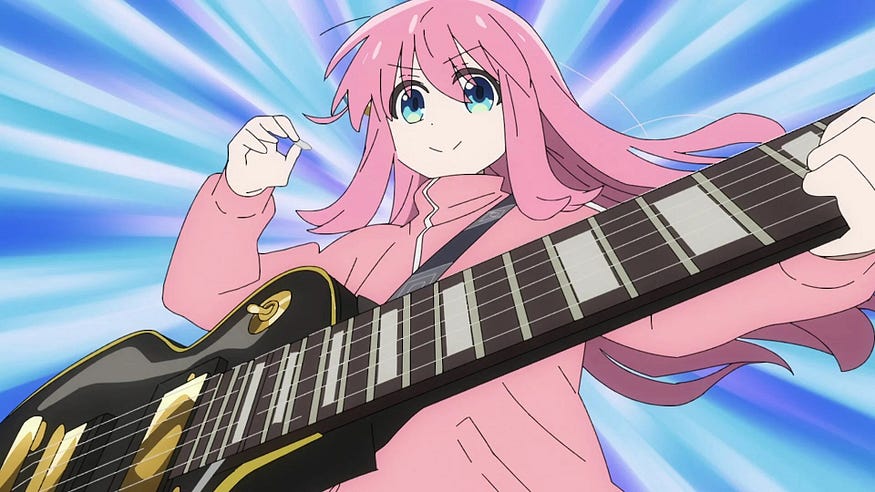Plot Summary
The story is about a young girl named Goto Hitori, whom her band members would call Bocchi, which translates to ‘Alone.’
Growing up, one of her major goals in life was to make friends, which she failed at in primary and middle school. Then, she plans to learn to play guitar so that she can connect with more people using music.
While this plan was about to fail, a cheerful girl named Nijika invited her to their band. That was the start. The series then explores Bocchi’s growth in the band, both psychologically, socially, and musically.
Throughout the series, the audience gets to explore a relatively ignored aspect among us- introversion. I’ve seen many shows portraying it wrongly, making it look like introversion means hating human interactions.
During Bocchi’s time at the Kessoku Band, she learns how to interact with different types of people and takes on tasks really challenging for introverts.
Many of these are quite ordinary tasks for extroverts or ambiverts, like greeting guests, handling the drink corner, and playing on the stage.
Bocchi and Her Goal
The goal of Bocchi was interesting and somewhat scary for any introvert.
Music and bands are some of the flashiest hobbies out there; the polar opposite of introversion. So, while being a slice of life anime, I found a shounen vibe in it. The way Bocchi rises from a nobody to a somewhat popular guitarist was exhilarating to see. Yes, it was indeed a shounen anime for introverts.

She runs a YouTube channel. Uploading my content online is another thing I find scary. Even if it is good, there will inevitably be negative remarks. Criticisms are often really, really frightening for introverts. So, the fact that she pulled that off was a great feat.
Side Characters
The other characters were no less impressive. One scene that stood out to me was when Nijika invited Hitori to join her band. Introverts can’t easily make friends on their own. They usually need another person who can reach out to them to form a bond. This moment may seem insignificant to outsiders, but it is a turning point in an introvert’s life.
Kita being the glowing extrovert, Bocchi being the extreme introvert, Ryo being the loner and unsocial (often mistaken as introversion), and Nijika being the balance to hold everything together was done neatly.
The diverse traits of the characters allowed for some fun and amusing interactions. Needless to say, the character developments were top-tier too. There were moments where I related to Bocchi so much that I felt second-hand embarrassment and instinctively hid my face.
Meanwhile, a dialogue from Ryo is stuck in my head —
“Abandoning your uniqueness is equivalent to dying.”
There are moments where the sheer pressure of society often makes us think about giving up on our quirks. But if we lose them, we lose one of our biggest identities. It just turns us into another nobody.
There are many other remarkable moments and dialogues in the anime, but I can’t touch upon all of them here. But I will remember them for a long time.
Music
Thanks to the show being within the music genre, it gifts us with some epic music. I’ve seen professional guitarists reacting to that one solo guitar moment of Bocchi and singing praises.
While I am no musical expert or have any skill with musical instruments, I vibed hard with the music in the show from an audience’s standpoint. All of them were J-rock music with beautiful lyrics.
Do I Recommend It?
Obviously. The show is perfect whether you are an introvert or an extrovert. The former will find it highly relatable and motivating to pursue their goals amidst the social anxiety and pressure.
The latter (extroverts) will understand how life is for introverts and why they react with embarrassment, shyness, or fear during normal interactions, and why they zone out often.
Besides these, if you are a fan of slice of life shows or music/bands, I can assure that you will enjoy it.
I highly recommend watching the anime instead of the manga, since the adaptation was better than the source material. I daresay, it is one of the best examples of how adaptations should be.
Funnily, the background animation had very low effort in many scenes. Some of them literally had still images. Yet, they executed the animation perfectly where it was needed. The focus is mostly on the lead characters here.
You also don’t want to miss the concert scenes from the anime. While the manga had them as well, the anime experience is over the top and super realistic. The music there is set to be in a way that it feels like you are listening from the audience. The shadows and lighting also add to the realistic expression.
I believe this blog explained perfectly how the adaptation was so grand and a masterclass:
Bocchi the Rock is a Masterclass in Anime Adaptation
Bocchi the Rock stands as a prime example of what makes an anime adaptation worth viewing over the original manga.
My Verdict and Rating
The voice acting, animation, comedy, and character development, everything earned my respect.
I must mention that one glitch scene of Bocchi, where she makes some almost inhuman sound, which was not any sound effect, but the actual voice acting of Aoyama. She is just that good!
It is apparent that a lot of effort was put into the series. It felt like the producers created something they love. Perhaps they also found the characters relatable?
My overall rating for the series (anime) is 8 out of 10. It could express what it wanted, which is one of its biggest traits.

Comments (5)
Leave a comment